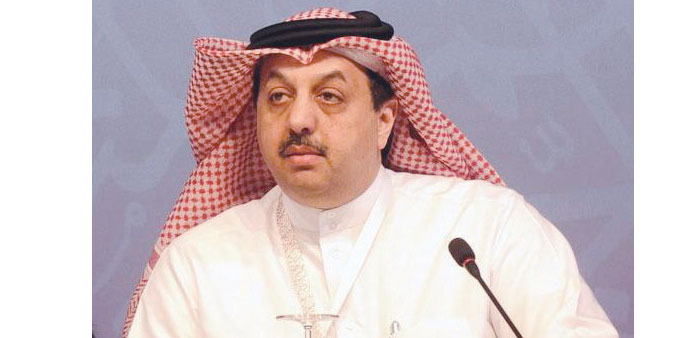QNA/Doha
Qatar’s accomplishments in international politics reflect the depth of HH the Emir Sheikh Tamim bin Hamad al-Thani’s vision, HE the Minister of Foreign Affairs Dr Khalid bin Mohamed al-Attiyah has said.
In an interview with Al Sharq, the Foreign Minister said: “All efforts have been exerted in order to implement the vision of HH the Emir at all levels - political, development, human and economic”.
Dr al-Attiyah underlined the strong relations between Qatar and other GCC countries, noting that difference of opinion does not change the nature of unity among GCC states.
Speaking about “Operation Decisive Storm”, al-Attiyah said that the UN Security Council Resolution 2216 reaffirms the GCC’s decision and comes at the request of Yemeni President Abd-Rabbu Mansour Hadi to intervene in Yemen. He said that the GCC countries’ initiative and the Security Council resolution will result in a solution soon.
Asked about the implications of the “Operation Decisive Storm” and Iran’s reaction to defend the Houthis, the Foreign Minister said that Houthis are part of the Yemeni people. Some of them, who are behind former president Ali Abdullah Saleh, were able to tamper with system. But they were surprised by the “Decisive Storm” which was launched at the request of the legitimate president- Abd-Rabbu Mansour Hadi. He added that the “Operation Decisive Storm” gives the Houthis an inevitable choice, namely to reverse their actions.
The Foreign Minister called on Houthis to withdraw from Sanaa and other cities, recognise President Hadi, obey his orders and return to the dialogue table.
On the Iranian nuclear issue, the Foreign Minister said that the GCC countries will not oppose any agreement with Iran that ensures the peaceful use of nuclear energy and prevents any military use, stressing that the security of the Gulf is the responsibility of the GCC people.
He noted that the GCC countries welcomed the 5+1 framework agreement with Iran. Eventually, what is really important to the GCC countries is to reach a clear, durable and explicit agreement that ensures the peaceful use of nuclear energy.
To another question Dr al-Attiyah said that the State of Qatar does not consider the Muslim Brotherhood a terrorist organisation, but a political party which practised democracy.
At the same time, al-Attiyah stressed that Qatar does not support the Muslim Brotherhood, noting that Qatar has no quarrel with Egypt, but has a difference in views, and what is really important for Qatar is that Egypt remains strong and stable as an important part of the Arab world.
Al-Attiyah wished that the Arab countries would go beyond some of these issues and focus on what is more dangerous for the Arab nation.
Speaking about the Syrian crisis, the Foreign Minister said that the Syrian people chose to demand justice and freedom and faced the military machine in the first six months alone without any help. He hoped to reach a political solution based on the decisions of the Geneva 1.
Al-Attiyah added that the Friends of Syria are now in a better position than before to exert pressure on the Syrian regime in order to reach a political solution that does not involve Bashar al-Assad because he is not a part of Syria’s future.
The Foreign Minister underlined that the Palestinian issue remains Qatar’s and all Arabs’ first and central issue.
He stressed that the Arab countries and the international community must find a solution to the suffering of the Palestinian people and allow them to live in dignity like other people of the world, and to put an end to the Israeli occupation and settlement operations.

HE the Minister of Foreign Affairs Dr Khalid bin Mohamed al-Attiyah.
